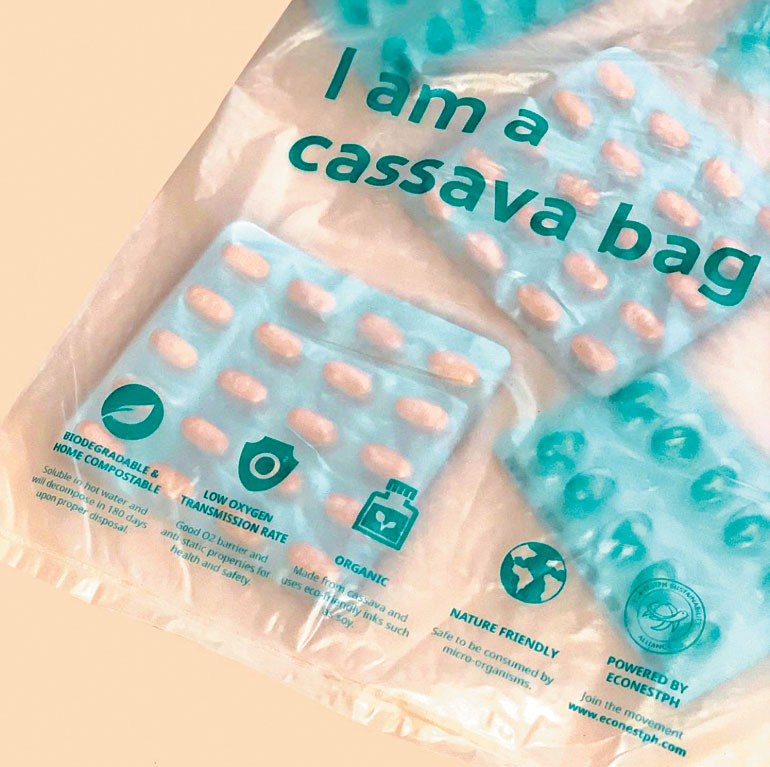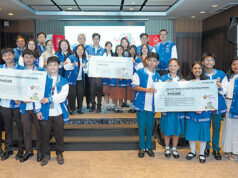
By Chelsey Keith P. Ignacio, Special Features Writer
The problem with plastic has become more evident for many consumers and businesses. Most plastics are made from fossil fuels and could take hundreds of years to decompose. But each year, according to Our World in Data, the world currently produces over 380 million tonnes of plastics. Mismanagement, overuse, and the few recycling of plastics then cause waste and pollution, which are harmful to the environment.
This plastic pollution problem is therefore multifaceted, as realized by the founders of SACHI-Group, Inc. Because more than the issue with the material itself, the plastic pollution problem is also about solid waste and climate change.
“To tackle those issues, the material, the systems, and the people’s behavior need to be addressed,” SACHI-Group CEO and Co-founder Prince Ang told BusinessWorld. “With cassava bags, we can take steps towards addressing the problem.”
SACHI-Group (Sustainable And Compostable Horizons Industries Group, Inc.) is a pioneer manufacturer of biodegradable and compostable cassava bags in the country. For the startup, cassava bags could complement the current solid waste infrastructure and enable users to practice proper disposal, hence could help address the plastic pollution problem.
Cassava bags may look like traditional plastics. But unlike the plastics commonly used today, cassava bags are not petroleum-based and do not leave toxic residues.
“The material is home compostable and water-soluble, giving those without experience in composting the ability to properly dispose of the bags,” Mr. Ang explained. “By manufacturing it locally, we can build the whole company with circularity at its core.”
SACHI-Group occupies an a 1100 sq. ft. area for its first production line of compostable cassava bags. With its advanced bioplastic extruding, cutting, sealing, and printing machines, the startup can supply over 70,000 tonnes every year. It utilizes plant-based and renewable resources like cassava starch for its main films, while the outer packaging and design are made from recycled, upcycled, or non-toxic materials.
The products of SACHI-Group include t-shirt shopping bags, e-commerce mailer pouches, grip hole bags, and cassava rolls for various uses. By manufacturing these locally, the startup is able to cut the production and delivery lead time from 90 days to as short as 20 days.
By far, one of SACHI-Group’s major partners, marketing and distribution company EcoNest Philippines, has distributed over 2,000 kgs of converted cassava resins, and over fifty small and medium enterprises and corporations across the country are using these cassava bags.
“We are looking forward to encouraging and tapping thousands of MSMEs and local/ international corporations in the coming years, especially those who are committed to supporting the Paris Agreement to achieve net zero by 2050,” Mr. Ang said.
SACHI-Group also plans to work with different stakeholders who seek to take actionable steps to develop a circular model in their organizations through the startup’s products and services, according to SACHI-Group Director and Co-founder Nikki Luy Sevilla, who also co-founded EcoNest Philippines.
For Ms. Sevilla, making the switch to cassava bags or employing circular approach to packaging “speaks volumes about the real principles and values” of those who run the companies.
“We, at SACHI-Group, Inc. envision a livable and greener future. Deciding to work towards circularity entails a different level of commitment and we are always thrilled to support those who are conscious in their business’ actions and impact on the community,” she said.
“As more and more brands increase the use of cassava bags, we can definitely see further developments in the performance and proper disposal of truly plant-based materials here in the Philippines. Any support to raise awareness and encouragement for other businesses to join our movement simply by using cassava bags will go a long way,” she added.



